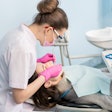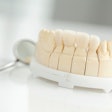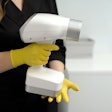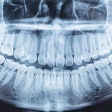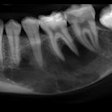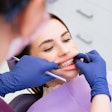
"Honey, I'm headed over to Wal-Mart to get dish detergent and garbage bags -- and have my teeth cleaned."
You're likely to hear remarks like this all the time if the vision of the California HealthCare Foundation comes true. The foundation this month released a study analyzing the feasibility of putting dental clinics, staffed by dental hygienists, in retail stores.
“I think it's a fantastic idea.”
— Lydia Jolie, R.D.H., vice president
of the California Dental Hygienists
Association
Though focused on California, the report suggests the idea might work as well, or better, in other states.
"As we have explored the challenges for many citizens, we thought there might be an interest in retail clinics," said Senior Program Officer Len Finocchio, Dr.P.H.
The report's author, consultant Mary Kate Scott, concluded that the clinics could provide oral care to people not currently getting enough such care, and that the clinics could pay for themselves -- as long as they didn't have to rely on the low reimbursement Medicaid provides for dental services in most states.
But making them work would depend on the support of a dentist, or a change in the scope of practice for hygienists in most states.
Filling a need
The foundation became interested in the idea because so many people in the U.S. are not getting the oral care they need. Scott cited statistics from the Health Resources and Services Administration, which found that 49 million Americans -- one in six -- live in an area lacking adequate dental services.
Even in places with plenty of dentists, some people -- particularly in rural areas -- lack transportation to get to appointments. Others can't afford the cost of dentistry. In California, Scott conducted three surveys with 275-537 respondents and margins of error of 3%-4%. She found that only half of Californians with insurance, and a quarter of those without, had been to the dentist in the past six months.
Retail dental clinics might help address these problems by offering, quick, convenient, inexpensive basic dental care. "At a minimum, clinics would have to offer essential diagnostic and preventive care, including screenings for schoolchildren, oral exams, x-rays, cleaning, polishing, fluoride varnish, and sealants," wrote Scott, adding that they could expand to whitening or straightening if there were sufficient demand. Hygienists staffing the clinics would refer patients to dentists for anything more complex.
To make the idea work in most states, new laws would have to be passed to expand hygienists’ duties and independence. In most states, hygienists aren't allowed to diagnose, Scott found, but Alaska, Colorado, and Maine are exceptions, she wrote.
In California, registered dental hygienists in alternative practice can work autonomously in residences with homebound occupants, schools, residential facilities, hospitals, and dental health professional shortage areas. Lygia Joley, RDH, vice president of the California Dental Hygienists’ Association, said the law would have to be changed to allow hygienists to operate the type of clinic envisioned in the report.
"I think it's a fantastic idea," she said, adding that additional education should be required if hygienists' scope of practice is expanded.
Another potential obstacle are laws in some states that prohibit ownership of a dental practice by anyone other than a dentist.
Asked to comment, an ADA spokesperson said the organization would issue a statement in the future.
Dollars and sense
The inspiration for dental retail clinics comes from existing retail healthcare clinics in drug, grocery, and big box stores. They offer a list of services with fixed prices for patients who pay in cash, and a list of acceptable insurers and related copayments.
Such clinics are becoming more common, Scott writes, with some 1,200 clinics in 36 states visited by almost 3.4 million Americans a year. She cited a previous survey by the foundation that found that the top eight out of the 10 most common medical procedures for which Medicaid pays in California are preventive or diagnositic.
Her own survey found that 44% of Californians would be very likely to use a retail dental clinic, while another 21% were open to the idea, with only 36% rejecting it. Among those with household incomes of less than $35,000, 61% said they would very likely use such a clinic.
The clinics could also succeed financially, according to Scott. She calculated the cost per hour to operate would be $48: $41 in operating expenses and $7 in amortized capital costs. Since the median national reimbursement rate under Medicaid is $22.74, the clinics could not be self-sustaining unless they also attract patients who paid out of pocket or through private insurance. (If you want to play with the figures, you can download her spreadsheet.)
But all this depends on retailers' willingness to provide space. The proposition might only be attractive if they believe they could sell products to the clinic patients, Scott wrote, and selling toothpaste and floss is less lucrative than the prescription drugs that a drugstore can sell to patients at a retail medical clinic.
Still, she concluded, stores might be interested in hosting clinics in areas where dental services are hard to come by and retail customers are relatively few. In these places, every visit by a patient could be valuable to the store.






